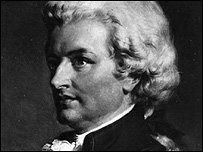People are always asking me what it is about Mozart's music that is healing or helpful. Why isn't Haydn's music as powerful, or Beethoven's or Schubert's? Actually, I believe that any great composer's music can be healing, keeping in mind our definition of healing. Remember that we define healing as "amelioration of symptoms." Healing is not synonomous with curing!
Starting back in the 1950's, a brilliant French ear, nose, and throat doctor and surgeon with a great love of music, starting treating many opera singers with various physical symptoms that prevented them from singing like they had. This man was Dr. Alfred Tomatis. One of his statements that was someone novel at the time was "the human voice cannot reproduce sounds that it cannot hear." Dr. Tomatis looked at hearing deficiencies that the patients exhibited and discovered that when the patients listened to Mozart's five violin concertos, in particular, that their hearing improved. Dr. Tomatis determined that these particular pieces of Mozart had the perfect range of pitches and the perfect timbre or tone color to heal the voice and the individual.
In the 1990's research was being conducted at the University of California at Irvine in which Mozart's Sonata in D Major for two pianos was being played for high school students about to take the SAT. In each trial, the students were divided into three groups. One group listened to their favorite pop music for 30 minutes before the test, one listened to nothing and one group listened to the Mozart piece. Repeatedly, the students who listened to the Mozart piece scored higher.
These two phenomena constributed to the idea of a "Mozart Effect." I personally believe that the media has greatly exaggerated the power of Mozart however I do believe that Mozart's music is healing, inspiring, beautiful, uplifting and amazing. Many people believe that Mozart was the greatest composer of all time because in his brief life, he was a master of every genre he attempted and he attempted all of the genres of his time: sonatas, symphonies, chamber music, opera, and choral music. If you haven't listened to any Mozart lately, treat yourself to some tonight!



